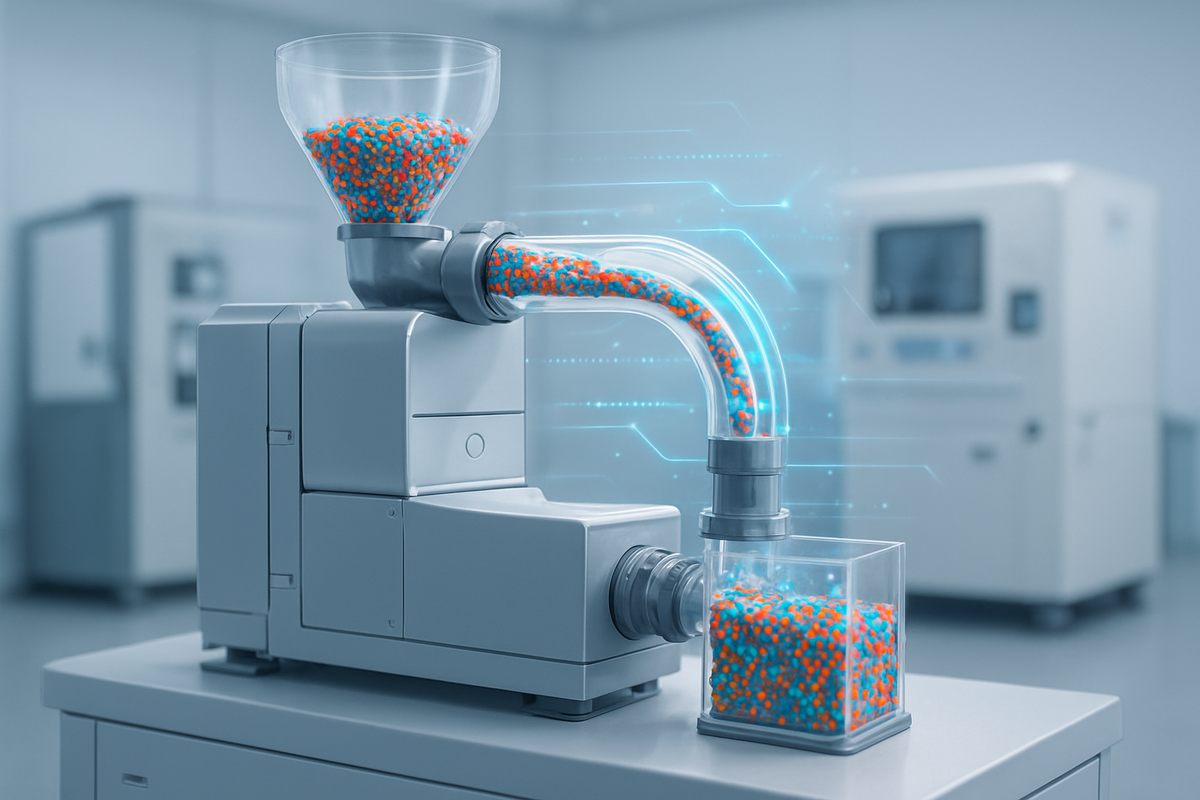
In a significant stride towards democratizing advanced manufacturing capabilities, Conair, a leading global supplier of auxiliary equipment for plastics processing, has been continuously refining and integrating its conveying technologies to offer what effectively functions as a plug-in conveying system. This ongoing evolution, rather than a single product launch, represents a concerted effort to bring high levels of automation, efficiency, and reliability within reach of small processors and work cells across the plastics industry. These advancements promise to streamline operations, reduce waste, and enhance productivity, marking a pivotal moment for smaller enterprises striving for competitiveness in a rapidly evolving market.
The implications extend beyond just operational efficiency; such technological leaps in auxiliary equipment can have a profound, albeit indirect, effect on the demand for raw plastic materials and related commodities. By enabling processors to handle materials more effectively, reduce material degradation, and minimize downtime, Conair's integrated solutions foster more consistent and optimized material consumption. This consistency can stabilize demand patterns for resin suppliers and potentially influence pricing dynamics by reducing the impact of production inefficiencies on material procurement.
The Technological Nexus: Conair's Integrated Conveying Innovations
Conair's approach to creating a "plug-in" conveying system for small processors is characterized by the intelligent integration of several key technologies developed over the past decade. These innovations collectively address critical challenges faced by smaller operations, such as limited resources, space constraints, and the need for versatile, reliable equipment.
Central to this integrated system is the Conair Long Distance Pump (LDP), first highlighted in September 2013. This direct-drive system eliminated belts and shivs, offering enhanced power and pulling force for transferring pellets, regrinds, and powders over significant distances (up to 600 feet or 183 meters). Its robust design minimizes maintenance, requiring only filter cleaning and gearbox lubrication every 20,000 hours or six years, significantly reducing operational overhead for small businesses. Complementing this is Conair's development of advanced Powder Loaders and Receivers, detailed in July 2015, featuring easy-to-remove, washable cartridge filters optimized for efficient cleaning and 100% product conveying without dust carryover, crucial for maintaining material integrity.
Further enhancing efficiency and material quality, Conair introduced its Wave Conveying technology (initially known as RP Pro) in 2014. This groundbreaking system allows for significantly slower resin conveying (two to three times slower) while maintaining throughput rates. By mitigating issues like dust generation, system component wear, and "angel hair" common with high-speed dilute phase conveying, Wave Conveying helps preserve resin integrity, directly impacting the quality of finished products and maximizing material value. More recently, around 2021, Conair emphasized its "Conveying with Optimizer" feature, which integrates artificial intelligence with its SmartFLX control. This AI-driven system autonomously adjusts air and material ratios, eliminating manual adjustments and compensating for varying conditions such as conveying distance, material bulk density, and regrind ratios. This level of automation is particularly transformative for small processors, reducing labor, minimizing errors, and ensuring consistent operation with limited staff. The continuous refinement and integration of these technologies enable a highly efficient, automated, and low-maintenance conveying solution that is remarkably adaptable to diverse plant layouts and material types, making it an ideal "plug-in" solution for small-scale plastics manufacturing.
Winners and Losers: Shifting Dynamics in the Plastics Ecosystem
The primary beneficiaries of Conair's (private company) integrated conveying solutions are undoubtedly small to medium-sized plastics processors. These companies, often operating with tighter margins and fewer personnel, gain access to advanced automation and efficiency previously reserved for larger enterprises. Increased uptime, reduced material waste, lower maintenance costs, and improved product quality directly translate to enhanced profitability and competitiveness. For these processors, the ability to "plug in" a reliable, intelligent conveying system means they can focus more on core manufacturing and less on auxiliary equipment management.
Raw plastic material suppliers, such as LyondellBasell Industries N.V. (NYSE: LYB) or Dow Inc. (NYSE: DOW), could experience a more stable and predictable demand for their products. As processors become more efficient and reduce material degradation, their consumption patterns become more consistent, potentially leading to stronger, more reliable order flows for raw materials. The reduction in waste also means that a higher percentage of purchased material is converted into salable products, increasing the overall value proposition of the raw plastic.
Conversely, competitors in the auxiliary equipment market that do not offer similar levels of integration, automation, and ease of use may find themselves at a disadvantage. Companies offering less sophisticated or more labor-intensive conveying solutions might see their market share erode as small processors increasingly seek out systems that offer a higher return on investment through reduced operational complexity and costs. Furthermore, businesses that provide services related to troubleshooting and maintaining less reliable conveying systems might see a decrease in demand for their specialized services as Conair's solutions require less intervention. The shift towards more automated and self-optimizing systems could also indirectly impact the demand for certain types of skilled labor traditionally involved in manual system adjustments and maintenance, prompting a need for workforce reskilling in the industry.
Wider Significance: A Leap Towards Industry 4.0 for All
Conair's advancements in conveying technology are not isolated incidents but rather integral components of broader industry trends, particularly the push towards Industry 4.0 and the digitalization of manufacturing. By offering AI-driven optimization and highly automated systems, Conair is enabling even the smallest processors to participate in the smart factory revolution. This democratization of advanced technology is crucial for maintaining a competitive manufacturing base, allowing smaller players to achieve the same levels of efficiency and quality as their larger counterparts.
The potential ripple effects on competitors are significant. Other auxiliary equipment manufacturers will be compelled to accelerate their own innovation cycles, focusing on greater automation, ease of integration, and predictive maintenance capabilities to remain relevant. This competitive pressure could lead to an overall uplift in the technological sophistication of the entire plastics auxiliary equipment sector. Partners in the manufacturing ecosystem, such as system integrators and automation specialists, will also find new opportunities in deploying and customizing these advanced conveying solutions for a wider range of clients.
From a regulatory standpoint, increased efficiency and reduced material waste align well with growing global emphasis on sustainability and circular economy principles. Technologies like Wave Conveying, which minimize material degradation and "angel hair," contribute directly to reducing plastic waste and improving resource utilization. While there are no direct new regulatory implications for this specific technology, it positions processors to better comply with future environmental mandates and consumer demands for more sustainable production practices. Historically, advancements in manufacturing efficiency have always driven industry forward, from the advent of mass production to the introduction of robotics. Conair's current trajectory echoes these past transformations, signaling a shift where intelligent automation becomes a standard, not a luxury, for plastics processing.
What Comes Next: The Future of Automated Material Handling
Looking ahead, the trajectory set by Conair's integrated conveying solutions points towards even greater levels of automation, intelligence, and modularity in material handling. In the short term, we can expect to see increased adoption of these systems by small processors, leading to a noticeable improvement in their operational benchmarks and overall output quality. This will likely spur further demand for training and support services focused on optimizing the use of AI-driven controls and advanced conveying techniques.
In the long term, the possibilities are vast. We could see further integration of conveying systems with other auxiliary equipment, such as dryers, blenders, and even processing machines, creating a truly seamless and self-optimizing manufacturing cell. The continuous feedback loops enabled by AI will likely become more sophisticated, allowing systems to predict maintenance needs, proactively adjust to material variations, and even self-diagnose and troubleshoot minor issues. This could lead to a future where conveying systems require minimal human intervention, operating almost entirely autonomously.
Market opportunities will emerge for companies specializing in data analytics and software solutions that can further enhance the insights gleaned from these intelligent conveying systems. Challenges may include the initial capital investment for some smaller processors, although the long-term cost savings often justify the expenditure. Strategic pivots for equipment manufacturers will involve focusing on user-friendly interfaces, robust cybersecurity for connected systems, and comprehensive customer support to guide users through the adoption of increasingly complex technologies. Potential scenarios include a significant uplift in the global competitiveness of small and medium-sized plastics manufacturers, fostering innovation and resilience across the industry.
Comprehensive Wrap-Up: A New Era for Small-Scale Plastics Processing
Conair's continuous advancements in conveying technology, culminating in what functions as an intelligent, plug-in system, represent a pivotal moment for the plastics processing industry, particularly for its smaller players. The key takeaways are clear: enhanced automation, unparalleled efficiency, reduced operational costs, and improved material quality are now more accessible than ever before. By integrating innovations like the Long Distance Pump, Wave Conveying, and AI-driven Optimizer, Conair has delivered a suite of solutions that empower small processors to compete effectively in a global marketplace.
Moving forward, the market will undoubtedly see a greater emphasis on integrated, intelligent auxiliary equipment. The days of disparate, manually intensive systems are slowly giving way to interconnected, self-optimizing solutions. This shift will not only elevate the productivity of individual companies but also contribute to a more sustainable and resilient plastics manufacturing sector as a whole.
For investors, the focus should be on companies that are at the forefront of this technological integration and automation trend, both in terms of auxiliary equipment manufacturing and the raw material suppliers who stand to benefit from more stable demand. Watch for continued innovation in AI and machine learning applications within manufacturing, as well as companies that demonstrate a strong commitment to supporting the adoption of these advanced technologies across all scales of production. The long-term impact of these advancements is likely to be a more efficient, higher-quality, and environmentally conscious plastics industry.
This content is intended for informational purposes only and is not financial advice







